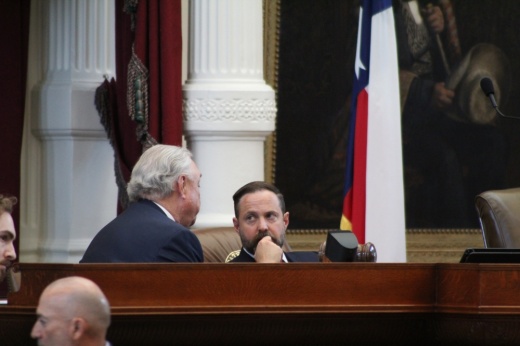House lawmakers approved six bills Aug. 21, all of which were drafted in response to the July 4-5 floods that killed at least 137 people in Central and West Texas.
Lawmakers said the bills were designed to mitigate the damage of future floods by requiring youth summer camps to implement approved disaster plans, establishing licensing requirements for local emergency managers and facilitating the development of a statewide emergency communications plan.
“We have a chance now to right these wrongs, to say ‘Never again,’” Rep. Drew Darby, R-San Angelo, said on the House floor.

At a glance
House lawmakers considered the following bills Aug. 21:
- House Bill 1: Aimed at protecting children by requiring Texas youth camps to create and annually update comprehensive plans for disasters and other emergencies, with daily fines for camps that do not comply
- Senate Bill 2: Would require local emergency management coordinators to become licensed and complete biennial training, after the state emergency management chief told lawmakers in July that there are “no minimum qualifications” to lead a city or county’s emergency operations
- House Bill 3: Seeks to improve communication among first responders by establishing a state interoperability council, which would develop a statewide emergency communications plan and administer grants to help local governments acquire new equipment
- Senate Bill 5: Would set aside up to $368 million for flood relief grants, including $240 million to match federal grants and $50 million to help communities impacted by the July 4-5 floods install flood warning sirens
- House Bill 20: Aimed at preventing fraudulent organizations from soliciting and receiving donations in the wake of disasters
- House Bill 22: Would expand Texas’ broadband infrastructure fund to cover emergency communication and warning systems
HB 1 passed with a 135-1 vote while HB 3 and HB 22 each passed 136-1. Rep. Brian Harrison, R-Midlothian, voted against HB 1, HB 3 and HB 22.
“This bill may not have saved every child, but if this ever saves even one child, one child, one little boy, one little girl, that is worth it to me,” Darby said about HB 1.
Also of note
The Community Foundation of the Texas Hill Country announced the organization will invest $40 million into a housing fund for victims of the July 4 flooding.
At an Aug. 21 press conference in Kerrville, Abbott said the nonprofit’s housing fund will help affected Texans receive new housing within months. When Hurricane Harvey struck in 2017, it took multiple years for some families to return to their residences, he said.
“All of the residents who lost a permanent residence in this region are not only going to be able to have that permanent residence fully rebuilt, but rebuilt at record speed,” Abbott said.
Additionally, the organization has donated $16 million to more than 50 local nonprofits assisting flood survivors, CEO Austin Dickinson said. These donations have assisted over 700 families, 200 small businesses and 17 volunteer fire departments.
The Community Foundation of the Texas Hill Country has funded a new water system in Hunt and assisted Hunt and Ingram ISDs with reopening for the 2025-26 school year, Dickinson said.
Zooming in
Under HB 1, all Texas youth camps would be required to submit an annual emergency plan to the Texas Department of State Health Services detailing responses to 12 emergency scenarios, including natural disasters, fires, epidemics, serious injuries and illnesses and lost campers.
The legislation would require emergency training for camp staff and fully fund inspections, Darby said. HB 1 would mandate that these emergency plans be shared with local emergency medical services prior to the start of camp.
“When the floods hit the camp for these girls, there was no plan,” Darby said. “With House Bill 1, there will now be a real emergency operations plan.”
The bill would require youth camps to have a safe exit that does not involve passing through a low water crossing, Rep. Erin Zwiener, D-Driftwood, said. Youth camp operators who did not comply with HB 1 could be fined up to $1,000 or lose their license, Darby said.
“One of the scariest things is when it floods and you don't have a way out,” Zwiener said. “We certainly heard stories from these floods of folks being stuck behind low water crossings and trapped in flooding areas.”
Under an amendment proposed by Rep. Donna Howard, D-Austin, HB 1 would ban youth camps from building cabins in the 100-year floodplain.
Harrison, who voted against HB 1, said he believed the amended legislation could “shutter countless camps, including Christian camps,” that have long operated in the state.
The upper chamber’s proposal, SB 1, would tighten requirements for camps’ emergency plans, prohibit camps from operating cabins in floodplains and require all campers to be evacuated once a flood warning is issued near a camp.
The passage of both HB 1 and SB 1 would create “the strongest youth camp safety legislation in the country,” Darby said.
What else?
SB 2 would require an emergency manager coordinator to be licensed by the Texas Commission on Fire Protection. If a county judge or city major is unable to declare a local disaster and request state and federal assistance, SB 2 would allow a sheriff to serve as an acting emergency management director with a county commissioner next in the chain of command, Rep. Ken King, R-Canadian, said.
The legislation would create a statewide volunteer management system detailing the experience and credentials of volunteers who may assist during a disaster. The law would establish a statewide meteorological data monitoring work group and a mass fatality operations rapid response team.
HB 3 is intended to provide improved communication between first responders during emergencies through the Texas Interoperability Council, King said. The council could administer grants to help local municipalities purchase equipment to be used in the statewide emergency communication system.
“My goal is to ensure that every first responder that puts their life on the line when we need them most has the emergency communication tools they need to be safe and keep those around them safe as well,” King said.
Put in perspective
The names of the 27 young girls who died during catastrophic flooding at Camp Mystic in Kerrville rang through the Texas House chamber Aug. 21. Twenty-seven campers and counselors died due to flooding at the private girls’ Christian summer camp, which is located on the banks of the Guadalupe River, according to its website.
Darby read aloud the victims’ names during a moment of silence as House lawmakers turned to face and pay their respects to the victims’ family members sitting in the House gallery.
“We share your grief,” Darby said. “We support you in all ways.”
During an Aug. 20 Senate committee hearing, Houston resident Brandt Dillon told lawmakers that he was “broken” after his 8-year-old daughter, Lucy, died in the July 4 flooding at Camp Mystic.
“When Lucy left for camp, it was the very first time she had ever slept away from us,” Dillon said Aug. 20. “We entrusted her care to the camp operators, and never for a moment did we believe she would be returned to us in a casket.”
Dillon urged legislators to pass “common-sense, nonpartisan camp safety reforms” to ensure that parents are sending their children to safe camps with “sufficient [and] enforceable” emergency plans.
“Do not water them down, so that no other parent has to endure what we and others have endured,” Dillon said.
State senators passed three other emergency response and flood relief bills Aug. 18, sending them to the House.
The background
House lawmakers’ approval of the slate of flood-related bills comes one day after they approved a congressional map that Texas Republicans have said is designed to net up to five new U.S. House seats for the GOP in 2026. Rep. Todd Hunter, a Corpus Christi Republican who filed the redistricting plan, has said 37 of Texas’ 38 congressional districts would be redrawn, with “the primary changes” focused on five Democratic-held districts in Houston, Dallas-Fort Worth, San Antonio and South Texas.
On the House floor Aug. 20, some Democrats questioned why the chamber was taking up redistricting before passing bills aimed at helping communities recover from the deadly July 4 weekend floods.
“Why was House Bill 1, the flood relief bill that is the House's answer to the deadly July 4 flooding that killed over 135 people, not the first order of business of this special session for the Texas House?” Rep. Gina Hinojosa, D-Austin, asked Aug. 20.
Rep. Ellen Troxclair, R-Lakeway, countered that “had the members of this House shown up and done their jobs in this first special session, we would have already passed critical flood relief legislation and provided financial relief and support for all of the impacted communities.”
Similar flood relief and redistricting proposals were filed during Texas lawmakers’ first special legislative session, which was cut short Aug. 15 due to a two-week Democratic walkout over redistricting. In Democrats’ absence, the House did not have enough members present to pass any bills.
Dozens of House Democrats returned to Austin on Aug. 18, saying they wanted to build a “legal record” to later challenge the proposed congressional map in court.






